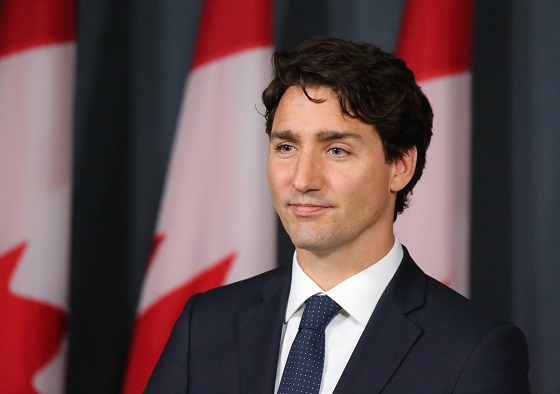Business
Trudeau gov’t set to introduce another internet regulation bill this week

From LifeSiteNews
While the Trudeau government claims its forthcoming ‘Online Harms’ bill is being created to protect kids, Conservative Party of Canada head Pierre Poilievre said that the federal government is just looking for clever ways to enact internet censorship laws.
Prime Minister Justin Trudeau’s Liberal government is introducing its “online harms” legislation this week, spurring fears that this may mean the revival of parts of a lapsed bill from 2021 which looked to target free speech by banning certain legal internet content.
The new bill, by Liberal Justice Minister Arif Virani, was posted on the House of Commons notice paper for February 26, 2024, and will soon be read in Parliament.
The Online Harms Act will modify existing laws, amending the Criminal Code as well as the Canadian Human Rights Act, in what the Trudeau Liberals claim will target certain cases of internet content removal, notably those involving child sexual abuse and pornography.
The new bill will also create an ombudsperson who will be charged with dealing with public complaints regarding online content, as well as put forth a regulatory function that will be charged with monitoring internet platform behaviors.
While the Trudeau government claims the bill is being created to protect kids, Conservative Party of Canada head Pierre Poilievre said that the federal government is looking for clever ways to enact internet censorship laws.
During a February 21 press conference, Poilievre said that Trudeau is looking to, in effect, criminalize speech he does not like.
“What does Justin Trudeau mean when he says the word ‘hate speech?’ He means speech he hates,” said Poilievre.
Virani had many times last year hinted that a new Online Harms Act bill would be forthcoming in 2024.
Of important note is that the new Online Harms Act looks to amend Canada’s Human Rights Act, to put back in place a hate speech provision, specifically, Section 13 of the Act, which the previous Conservative government under Stephen Harper had repealed in 2013.
Many fear that the new bill will be similar to the failed June 2021 bill introduced by then-Justice Minister David Lametti. Lametti had introduced Bill 36, “An Act to amend the Criminal Code and the Canadian Human Rights Act and to make related amendments to another Act (hate propaganda, hate crimes and hate speech),” which was blasted as a controversial “hate speech” law that would give police the power to “do something” about online “hate.”
It was feared that if passed, it would target bloggers and social media users for speaking their minds.
Bill C-36 included text to amend Canada’s Criminal Code and Human Rights Act to define “hatred” as “the emotion that involves detestation or vilification and that is stronger than dislike or disdain (haine).”
If passed, the bill would have theoretically allow a tribunal to judge anyone who has a complaint of online “hate” leveled against them, even if he has not committed a crime. If found guilty, the person would have been in violation of the new law and could have faced fines of up to $70,000 as well as house arrest.
Two other Trudeau bills dealing with freedom as it relates to the internet have become law, the first being Bill C-11, or the Online Streaming Act, which mandates that Canada’s broadcast regulator the Canadian Radio-television and Telecommunications Commission (CRTC) oversee regulating online content on platforms such as YouTube and Netflix to ensure that such platforms are promoting content in accordance with a variety of its guidelines.
Trudeau’s other internet censorship law, the Online News Act, was passed by the Senate in June of last year.
The Online News Act mandated that Big Tech companies pay to publish Canadian content on their platforms. As a result, Meta, the parent company of Facebook and Instagram, has blocked all access to news content in Canada.
Critics of Trudeau’s recent laws, such as tech mogul Elon Musk, have said it shows that “Trudeau is trying to crush free speech in Canada.”
Internet
US government gave $22 million to nonprofit teaching teens about sex toys: report

From LifeSiteNews
The Center for Innovative Public Health Research’s website suggests teenage girls make their ‘own decisions’ about sex and not let their parents know if they don’t want to.
For almost a decade, the U.S. government funded a group that actively works to teach kids how to use sex toys and then keep them hidden from their parents to the tune of $22 million.
According to investigative reporter Hannah Grossman at the Manhattan Institute, The Center for Innovative Public Health Research (CIPHR) has been educating minors about sex toys with public funds.
Records show that the millions given to the group since 2016, according to its website, go toward “health education programs” that “promote positive human development.”
However, the actual contents of the programs, as can be seen from comments from CIPHR CEO Michele Ybarra, seem to suggest that its idea of “human” development is skewed toward radical sex education doctrine.
In 2017, CIPHR launched Girl2Girl, which is funded by federal money to promote “sex-ed program just for teen girls who are into girls.” Its website lets users, who are girls between ages 14 and 16, sign up for “daily text messages … about things like sex with girls and boys.”
The actual content of some of the messages is very concerning. Its website notes that some of the texts talk about “lube and sex toys” as well as “the different types of sex and ways to increase pleasure.”
The website actively calls upon teenage girls to make their “own decisions” and not let their parents know if they don’t want to.
Grossman shared a video clip on X of Ybarra explaining how they educate minors about the use of “sex toys” and dealing with their parents if they are found out.
The clip, from a 2022 Brown University webinar, shows Ybarra telling researchers how to prepare “young person(s)” for her research.
She said if they are doing “focus groups,” she will ask them, “Okay, so what happens if somebody comes into the room and sees words like penis and sex toys on your screen — on your computer screen or on your phone? What if it’s your mom?’”
In 2023, CIPHR launched Transcendent Health, which is a sex-education program for minors who are gender confused. This initiative received $1.3 million of federal grant money that expired last month.
Grossman observed that the federal government “should not fund programs that send sexually explicit messages to minors and encourage them to conceal these communications from parents.”
She noted that in order to protect children and “prevent further harm,” U.S. President Donald Trump’s Department of Health and Human Services “should immediately cancel CIPHR’s active contract and deny its future grant applications.”
“By doing so, the Trump administration can send a clear message: Taxpayers will no longer foot the bill for perverted ‘research’ projects,” she noted.
The Trump administration has thus far, through the Department of Government Efficiency (DOGE), exposed billions in government waste and fraud. Many such uses of taxpayer dollars are currently under review by the administration, including pro-abortion and pro-censorship activity through USAID, “Diversity, Equity, and Inclusion and neo-Marxist class warfare propaganda” through the National Science Foundation, and billions to left-wing “green energy” nonprofits through the Environmental Protection Agency.
Business
Canadian Police Raid Sophisticated Vancouver Fentanyl Labs, But Insist Millions of Pills Not Destined for U.S.

 Sam Cooper
Sam Cooper
Mounties say labs outfitted with high-grade chemistry equipment and a trained chemist reveal transnational crime groups are advancing in technical sophistication and drug production capacity
Amid a growing trade war between Washington and Beijing, Canada—targeted alongside Mexico and China for special tariffs related to Chinese fentanyl supply chains—has dismantled a sophisticated network of fentanyl labs across British Columbia and arrested an academic lab chemist, the RCMP said Thursday.
At a press conference in Vancouver, senior investigators stood behind seized lab equipment and fentanyl supplies, telling reporters the operation had prevented millions of potentially lethal pills from reaching the streets.
“This interdiction has prevented several million potentially lethal doses of fentanyl from being produced and distributed across Canada,” said Cpl. Arash Seyed. But the presence of commercial-grade laboratory equipment at each of the sites—paired with the arrest of a suspect believed to have formal training in chemistry—signals an evolution in the capabilities of organized crime networks, with “progressively enhanced scientific and technical expertise among transnational organized crime groups involved in the production and distribution of illicit drugs,” Seyed added.
This investigation is ongoing, while the seized drugs, precursor chemicals, and other evidence continue to be processed, police said.
Recent Canadian data confirms the country has become an exporter of fentanyl, and experts identify British Columbia as the epicenter of clandestine labs supplied by Chinese precursors and linked to Mexican cartel distributors upstream.
In a statement that appears politically responsive to the evolving Trump trade threats, Assistant Commissioner David Teboul said, “There continues to be no evidence, in this case and others, that these labs are producing fentanyl for exportation into the United States.”
In late March, during coordinated raids across the suburban municipalities of Pitt Meadows, Mission, Aldergrove, Langley, and Richmond, investigators took down three clandestine fentanyl production sites.
The labs were described by the RCMP as “equipped with specialized chemical processing equipment often found in academic and professional research facilities.” Photos released by authorities show stainless steel reaction vessels, industrial filters, and what appear to be commercial-scale tablet presses and drying trays—pointing to mass production capabilities.
The takedown comes as Canada finds itself in the crosshairs of intensifying geopolitical tension.
Fentanyl remains the leading cause of drug-related deaths in Canada, with toxic supply chains increasingly linked to hybrid transnational networks involving Chinese chemical brokers and domestic Canadian producers.
RCMP said the sprawling B.C. lab probe was launched in the summer of 2023, with teams initiating an investigation into the importation of unregulated chemicals and commercial laboratory equipment that could be used for synthesizing illicit drugs including fentanyl, MDMA, and GHB.
The Bureau is a reader-supported publication.
To receive new posts and support my work, consider becoming a free or paid subscriber.
Invite your friends and earn rewards
-

 2025 Federal Election1 day ago
2025 Federal Election1 day agoRCMP memo warns of Chinese interference on Canadian university campuses to affect election
-

 2025 Federal Election2 days ago
2025 Federal Election2 days agoConservative Party urges investigation into Carney plan to spend $1 billion on heat pumps
-

 Alberta2 days ago
Alberta2 days agoAlberta takes big step towards shorter wait times and higher quality health care
-

 2025 Federal Election2 days ago
2025 Federal Election2 days agoFifty Shades of Mark Carney
-

 2025 Federal Election20 hours ago
2025 Federal Election20 hours agoResearchers Link China’s Intelligence and Elite Influence Arms to B.C. Government, Liberal Party, and Trudeau-Appointed Senator
-

 Business2 days ago
Business2 days agoTrump raises China tariffs to 125%, announces 90-day pause for countries who’ve reached out to negotiate
-

 2025 Federal Election2 days ago
2025 Federal Election2 days agoCorporate Media Isn’t Reporting on Foreign Interference—It’s Covering for It
-

 2025 Federal Election1 day ago
2025 Federal Election1 day agoThe status quo in Canadian politics isn’t sustainable for national unity






